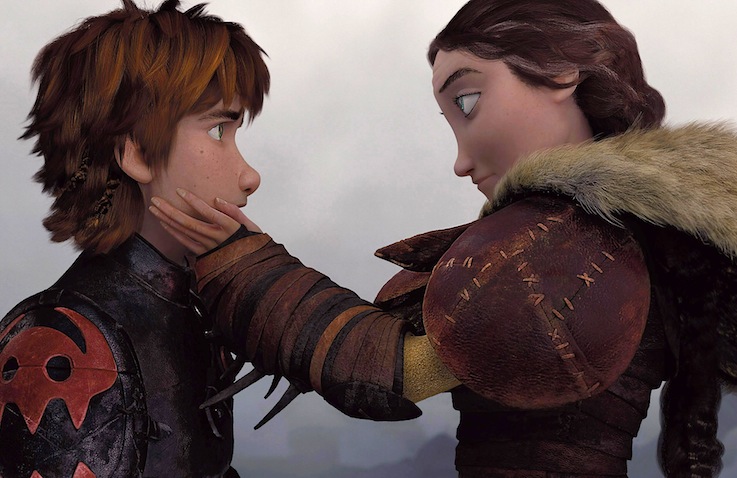
For most of their history, which has now lasted over 15 years (“Antz” and “The Prince Of Egypt” both debuted in 1998), DreamWorks Animation seemed to be content with making a quick buck and raising a cheap laugh. Some of their output was better than others (the original “Shrek” at one end of the scale, “Shark Tale” at the other), but even the better films paled in comparison to the output of arch-rivals Pixar, however profitable they are. These days, things have changed. For one, the company’s films aren’t all that profitable (“Rise Of The Guardians,” “Turbo” and “Mr. Peabody & Sherman” all disappointed financially). But for another, the quality gap has closed, with Pixar hitting something of a creative rut, and DreamWorks putting out films that are as good as or better than their rivals. Well, one film, at least: 2010’s “How To Train Your Dragon,” which took an unpromising premise and turned it into something funny, exciting and emotionally satisfying in a way that relatively few of their films are.
And now it has a sequel, “How To Train Your Dragon 2.” The bad news is that it’s more of a “Kung Fu Panda 2” than a “Toy Story 2” in terms of animated sequels, but the good news is that it’s still a fairly decent film, if a decided step down from its predecessor.

It’s five years on from the events of the original film, and all is harmonious in the Viking village of Berk, with dragons and humans living together after years of war. Our hero Hiccup (Jay Baruchel), now firmly coupled up with love interest Astrid (America Ferrera), is being groomed to take over the chief’s position by his father Stoic (Gerard Butler), but he’s more interested in exploring the world with his dragon Toothless. On one of these trips, he encounters dragon trapper Eret (Kit Harrington), who claims to be working for a man named Drago Bludvist (Djimon Hounsou), who’s building an army of dragons. But there’s another surprise out there in the mists too: Hiccup’s long-lost mother Valka (Cate Blanchett), who’s running a secret sanctuary for dragons.
Hiccup’s exploration of an ever-growing world serves as a neat metaphor for one of the film’s principal concerns: expanding the ‘HTTYD’ universe to the extent that it can support an ongoing franchise. We get new characters, new dragons, new gadgets and new mythology, in a way that’s rare even in the animation world—this is closer to a live-action franchise in the way it continues to the story, right down to the way it apes “Empire Strikes Back” in multiple ways. Beyond that, though, it’s something of an echo of the plot from the first film, with Hiccup trying to be his own man, and a couple of giant battles in the last act that involve taking down a giant beastie. There are enough new elements here to stop it feeling like a total retread, especially the addition of Blanchett’s character, but there’s a slight sense of not wanting to fix what wasn’t broken.

Except that in some cases, they have. The first film was always more of an adventure than a comedy, but the lighter-hearted bits were able to elicit a laugh more often than not. Here, the comedic relief, mostly from Hiccup and Astrid’s pals, voiced by Jonah Hill, Christopher Mintz-Plasse, Kristen Wiig and TJ Miller, is forced and never especially funny, at least not to older audiences (the humor feels like it’s intended for younger crowds than the first film, but the story’s darkness seems to skew older). And Ferrera’s character, a sparky take-no-shit female lead in the original, is here reduced to being the girlfriend, sitting out most of the action and letting Hiccup save the day.
The film’s also missing the strong emotional throughline of the first one. There, Hiccup wanted acceptance from his father, and sought to teach him that his hatred of dragons was ill-founded, but things are much muddier here. There are moments at which it seems that the film wants to be about Hiccup’s quest to find out who he’s meant to be, but that never really seems to be in doubt, despite him occasionally protesting the opposite. As is quite common with sequels, it doesn’t really feel like it’s a film that’s about anything (unless, if you wanted to look for something more sinister, in which case the vaguely foreign other-ness of Hounsou’s villain and regular references to “looking after your own” seem to point to a message of non-interventionism and anti-immigration, though we might be reading too much into it).

That said, taken purely as a tentpole sequel to a kids’ movie, there’s still a good time to be had here. For one, it’s still visually spectacular. Roger Deakins again served as a consultant, and the result is that the film looks beautiful even in its quiet moments. And in its less quiet moments, perhaps even more so: the action is on a far bigger and more awe-inspiring scale than before, and the use of 3D remains exemplary, truly making the flying sequences soar.
And after meandering for a while, the story kicks into gear in the third act, with a couple of legitimately shocking and well-executed developments that do pack a punch missing elsewhere in the film. Even better, while it briefly looks like the film will only tell half its story and leave the rest for the third film, it carries on and sees it through (it’s depressing that this is the bar a blockbuster has to clear these days, but it clears it nonetheless). As a result, few fans of the original are likely to be truly disappointed, and the film is certainly in the top tier of the studio’s output. It’s just a shame that it doesn’t quite have the same beating heart as its predecessor. [B-]
Browse through all our coverage of the 2014 Cannes Film Festival by clicking here.

